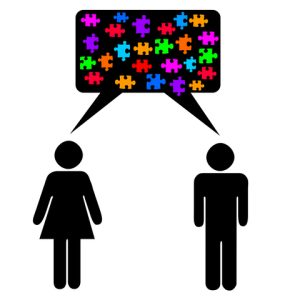“A Double Whammy”
June 5, 2014
It has been awhile since I posted my last blog article. The pace of my postings has slowed over the months. And the pace of everything I do has slowed.
Staring out into my yard one day, the realization really struck me: I’m getting old! Next birthday I’ll be sixty, with over half my life living with MS. It is taking me longer to do things. Napping and resting more each day is necessary. There are many things I cannot do alone anymore and I need to wait for someone to help me. All these things eat up the minutes of my day.
Two things happen when you grow older with MS.
1. Normal people start experiencing many things that a person with MS may have been experiencing already: leaky bladders, less balance and coordination, weakness, fatigue, less strength and endurance, cognitive issues. Aging compounds MS symptoms. Wow—a double whammy. I personally noticed increased fatigue and weakness when I became post menopausal 1 ½ years ago.
2. With MS, it is always tricky trying to figure out what is causing what; is the MS acting up on its own, or is it re-acting to something else. There is substantial interplay between physical, emotional, and mental health. When you grow older, it becomes trickier, since age and hormonal changes (e.g. menopause) affects many things that MS affects. For example, are cognitive problems a new symptom of MS, or is it due to aging?
With regard to #2, I decided, at this point, why care about figuring what is causing what? The focus now should be what can I do to help these things as opposed to asking why is this happening. Like doing mental exercises and adjusting my exercise programs to maintain strength, endurance, etc.
Point number #1 has been a difficult adjustment for me. This year has been quite busy with numerous things. In addition to my regular household responsibilities, I became involved in helping four immediate family members with serious (separate) problems, had out-of-town guests, and did extra MS-related counseling and events—all in addition to trying to maintain my own MS-related issues (doctors, tests, new adaptive equipment, etc.).
My life has always been this way. Busy, helping out, achieving, overcoming obstacles… People depending on me more often than I ever depended on them. And that was okay because that is the type of person I am.
But–
Lately, everything changed. My brain went fuzzy. Motivation to go anywhere or do anything stopped. I didn’t exercise, and lost strength. All I wanted to do was sit or sleep.
My MS symptoms worsened. I was mentally, emotionally, and physically drained from things going on in my life. I’m tired, feel hurt and deflated. Like someone pulled the plug out of me. I didn’t make a conscientious decision to shut things down; my body forced it on me.
Some folks have an easier time “letting things go”, or have financial resources to help get things done around the house. Others, like me, don’t.
The MS in my life has made me grow older faster. Not on the outside—everyone still tells me “how good I look” and not nearly my age. But I feel like I am eighty and my body certainly functions like it. Actually, my body has been functioning like an eighty-year old for at least the last twenty years. So, I guess maybe I’m maybe pushing the century mark?
That’s the downside of getting old with MS. Like an old car, things are wearing out, breaking down and going slower. Lots of dents and bruises. Worn out from all the miles travelled at an age younger than the average normal, healthy person.
But there’s definitely an upside. All those miles travelled with MS and age brings with it a lot of wisdom, strength and experience. As I sat in my yard reflecting on my life, I started making a list of what the upsides of MS are/were for me, and I am sure others as well:
• I’m a survivor and a success. I focused on what I was able to do, not what I couldn’t do. As a mother, teacher, and educated businesswoman I learned to manage my life with MS while sharing and supporting others: my entire family, friends, children, teens, persons living with all types of illnesses/disabilities and the elderly. I did this voluntarily through my daily life—listening, sharing, talking, speaking, writing, letters, phone calls, cards, social media, holding hands and giving hugs. All for free.
The upside? Priceless payback in knowledge, personal growth and problem solving acquired from all the interactions. I have found that so many people who acquired MS are of this same nature. Positive achievers. The irony of getting MS altered my personal life actually for the better in terms of my life’s goals and direction.
• I never took things for granted and always appreciated so many people and things in my life. A sunrise, an outing with a friend, the hand controls in my car, my freedom from living in the U.S… Being wealthy or keeping up with the Joneses didn’t matter. I was satisfied with what I had. MS, or any chronic illness can make you be this way. You don’t lose sight of what really matters in life.
• You can’t recover an opportunity after it is missed or time after it has passed. Whenever possible, I strived to enjoy as many things as I could. One never knows what the future holds or how fragile life can be. Having MS or another major health issue will do that to you.
Life can turn on a dime, as the saying goes. My awesome sixteen-year old nephew was in an accident and was brain dead for twelve days before he passed. My dad died of a heart attack in 1972 at age 45 when I was seventeen. An acquaintance of mine fell out of a tree and became a quadriplegic in his forties. I lost one of my best friends of cancer at the age of forty-nine. My husband and I were caretakers for his bedbound and blind grandmother for fifteen years. The list goes on…
• Living with MS taught me how to take care of body and protect it. Eating, sleeping and exercising properly. Using walking aids. Maintaining good health and avoiding drugs, smoking, and taking huge risks. I paid attention to my body. When I was 32, I took quick action for a weird-looking mole on my back, only to find out that I had malignant melanoma and would have died six months later otherwise.
My internist jokes that I am healthier than most people he sees all day! I got results back today on thorough blood work, and everything was normal. (Too bad my sensory and motor functions are a MeSs!)
• I have the virtues of patience, empathy, compassion. I became a whiz with commonsense, logic and communications. I fight for what is right and what I am entitled to.
• I am an expert in managing MS. Though MS took control of my life at times, I knew how to get back in control.
I recently called an old friend of mine whose husband died unexpectedly last month. She has had MS over thirty years, is seventy years old and her hubby was her loving caretaker. Being a fellow old veteran MS buddy of mine for 25 years, I wanted to check in on her now that all of the memorial activities have ceased and the reality of her new situation has begun.
We talked about her present position and future plans, about MS, and so many other things. There are quite a few things I would like to share about our conversation that I believe is worthy for someone with or without MS at any age to think about.
• It’s essential to have a solid network of friends and family. You just never know if your caretaker will pass or leave you. “J” is ambulatory, but she does have her limitations in other ways because of MS. J has no children. Though dependent on her husband whom she had a loving relationship with, she maintained her independence as much as possible. One of my favorite expressions is “Use your mouth and your intelligence”, and J does that. Her wonderful circle of support helped her with the memorial and the aftermath of things to do. Going forward, her “circle’ will help out with her car and her house.
• It’s important to have a plan in place in the event your caretaker/significant other leave before you do. Where would you live? Who could take care of what? Plans should involve short and long-term healthcare, short and long-term finances, wills, living wills, medical powers of attorney, memorial desires in writing.
• Do you know where to find important information, or how to do things your significant other does? For example, my husband knows all about the “outside” of the house (e.g. circuit breakers, timers, sprinklers, all of info about our RV…) and I don’t. I know all about the household finances, taxes, investments, insurance, where all the important documents are kept and he doesn’t. We need to find the time to educate each other.
• It is never too early to know how to take care of yourself and depend on yourself financially. When my dad died, there were three of us kids and my mother was a homemaker. I learned early to work, get a college education and into a high-paying career field, save and invest. Good thing. I got MS in my twenties. One never thinks it will happen to him/her.
• Age is wisdom. J and I talked about how well we know what is best for us and how we have the confidence to trust our intuition and judgment in making decisions. We also know when to reach out to a person we can trust to discuss something with. After all, two heads can be better than one.
For instance, J mentioned that her neurologist is pushing her to switch her DMD from Avonex (requiring a weekly injection but working well for her) to a newer oral treatment. Her answer? “NO! I know my body, and I don’t want any new drug with new, unknown side effects and more MRI monitoring.” She asked me what I thought about her decision.
• Finally, WE are in charge of our own bodies. At a recent visit to a new internist, I declined a bone density test, Pap smear, mammogram, colonoscopy, and two vaccinations. After explaining why, she accepted what I had to say, and said she will always work with me.
Getting older is a welcome if you have your health. The truth is, living with MS is very hard. As I get older, it is getting harder and more complicated. I get tears in my eyes when I see commercials of happy senior citizens in active adult communities.
I’m in the so-called Golden Years and retirement. It’s time to let more things go and make the most of it. This doer part of my personality needs to be turned down lower to control my self-induced stress. I just booked a cruise to Hawaii, while I have the opportunity and the time.
Now I am going to fix myself a margarita and watch the hummingbirds on my patio. And not think.
www.DebbieMS.com
Author/MS Counselor/Living with MS

 “Strategies & Tips”
“Strategies & Tips”
